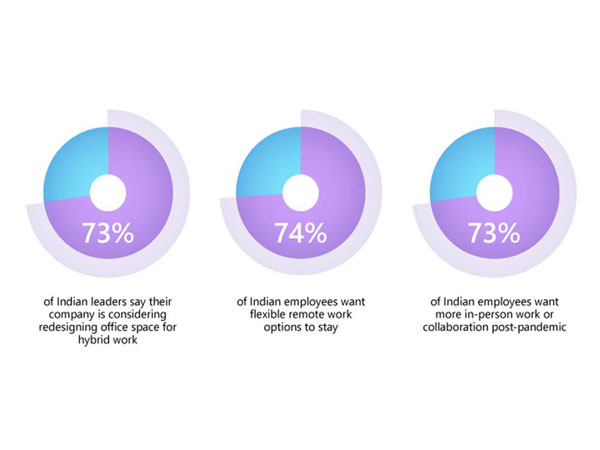NEW DELHI : Nearly three-fourths (74 per cent) of Indian employees say they want more flexible remote work options while at the same time 73 per cent of them are also craving more in-person time with their teams, according to findings of Microsoft’s first annual work trend index released on Thursday.
To prepare, 73 per cent of business decision makers are considering redesigning physical spaces to better accommodate hybrid work environments. The data is clear: extreme flexibility and hybrid work will define the post-pandemic workplace.
Microsoft said last year’s move to remote work boosted feelings of inclusion for workers because everyone was in the same virtual room. But the move to hybrid will need to ensure employees are given the flexibility to work when and where they want, as well as the tools they need to equally contribute from wherever they happen to be.
Read More
- Israeli missiles hit site in Iran: Report
- US: New York Capitol hit by cyberattack, budget deal delayed
- Whistleblower alleges UN cover-up of special favours for China, ahead of UK’s foreign affairs committee inquiry
- Singapore announces Lawrence Wong to take over as Prime Minister on May 15
- At least 33 killed, 27 injured in flash floods in Afghanistan
The 2021 work trend index outlines findings from a study of more than 30,000 people in 31 countries and analyses trillions of aggregate productivity and labour signals across Microsoft 365 and LinkedIn. It also includes perspectives from experts who have studied collaboration, social capital and space design at work for decades.
“If we have learnt one thing in the last year, it is that we are no longer bound to traditional notions of space and time when it comes to how, when and where we work,” said Rajiv Sodhi, Chief Operating Officer of Microsoft India.
The findings attest that remote work has created new opportunities but there are challenges ahead as well.
“We believe hybrid work is the future and a successful hybrid strategy will require extreme flexibility. As every organisation fundamentally reimagines itself for the hybrid work era, we are collectively learning and innovating on how we will shape the future of work in India. It is time to embrace work as a frame of mind, not a place you go.”
Creating a hybrid work plan for any organisation requires a flexible operating model spanning people, places and processes, show index findings.
To help people thrive, organisations need to rethink the entire employee experience — from creating culture to attracting and retaining talent and building privacy-backed listening systems.
The findings say work has become more human and authentic. Co-workers leaned on each other in new ways to get through the last year.
One among four (24 per cent) Indian employees has cried with a colleague and 35 per cent people are less likely to feel embarrassed now when their home lives show up at work. As living rooms made way for work meetings, 37 per cent people got to meet their co-workers’ families.
The genuine interactions with coworkers are helping to foster a workplace where 63 per cent of Indian workers said they are more likely to be their full, authentic selves at work.
At the same time, digital overload is real and rising. Self-assessed productivity has remained the same or higher for many employees over the past year, but at a human cost.
About 62 per cent of the Indian workforce says their companies are asking too much of them at a time like this and 13 per cent say their employer does not care about their work-life balance.
More than half (57 per cent) of Indian employees feel overworked and 32 per cent feel exhausted.
The findings say India’s first generation of digital natives (Gen Z) appears to be suffering and need to be re-energised. Nearly 71 per cent of this generation — those between the ages of 18 and 25 years — say they are merely surviving or flat-out struggling.
Very significantly, a vast talent marketplace is one of the brightest outcomes from shift to remote work. Remote job postings on LinkedIn increased more than five times in the last year, and people are taking notice.
This fundamental shift expands economic opportunity for individuals and enables organisations to build high-performing, diverse teams from a near-limitless talent pool. (ANI)
Liked this story? We’ll send you more. Subscribe to TAS newsletter and get stories delivered to your inbox. Click to get started.







